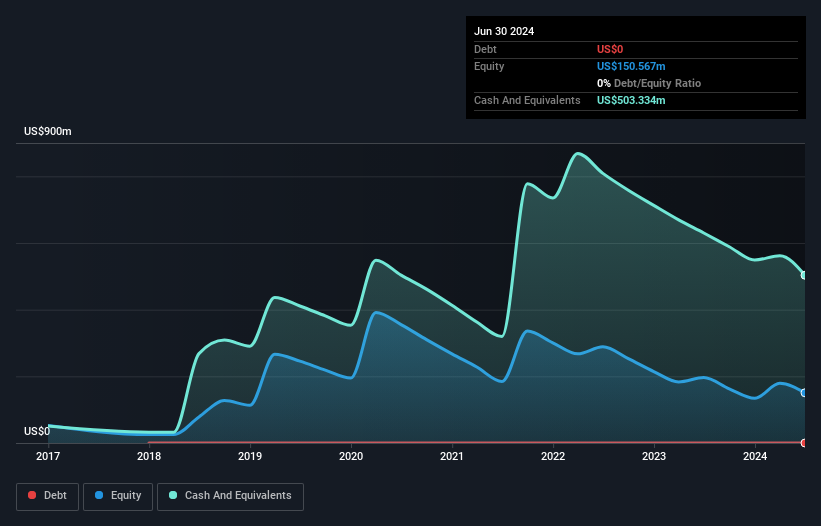- United States
- /
- Biotech
- /
- NasdaqGS:ALEC
We Think Alector (NASDAQ:ALEC) Needs To Drive Business Growth Carefully
Even when a business is losing money, it's possible for shareholders to make money if they buy a good business at the right price. For example, although software-as-a-service business Salesforce.com lost money for years while it grew recurring revenue, if you held shares since 2005, you'd have done very well indeed. But the harsh reality is that very many loss making companies burn through all their cash and go bankrupt.
Given this risk, we thought we'd take a look at whether Alector (NASDAQ:ALEC) shareholders should be worried about its cash burn. In this report, we will consider the company's annual negative free cash flow, henceforth referring to it as the 'cash burn'. The first step is to compare its cash burn with its cash reserves, to give us its 'cash runway'.
Check out our latest analysis for Alector
How Long Is Alector's Cash Runway?
A company's cash runway is calculated by dividing its cash hoard by its cash burn. As at June 2024, Alector had cash of US$503m and no debt. Looking at the last year, the company burnt through US$218m. That means it had a cash runway of about 2.3 years as of June 2024. That's decent, giving the company a couple years to develop its business. You can see how its cash balance has changed over time in the image below.

How Well Is Alector Growing?
At first glance it's a bit worrying to see that Alector actually boosted its cash burn by 12%, year on year. And we must say we find it concerning that operating revenue dropped 46% over the same period. Taken together, we think these growth metrics are a little worrying. While the past is always worth studying, it is the future that matters most of all. So you might want to take a peek at how much the company is expected to grow in the next few years.
How Hard Would It Be For Alector To Raise More Cash For Growth?
Even though it seems like Alector is developing its business nicely, we still like to consider how easily it could raise more money to accelerate growth. Companies can raise capital through either debt or equity. One of the main advantages held by publicly listed companies is that they can sell shares to investors to raise cash and fund growth. By looking at a company's cash burn relative to its market capitalisation, we gain insight on how much shareholders would be diluted if the company needed to raise enough cash to cover another year's cash burn.
Alector's cash burn of US$218m is about 43% of its US$506m market capitalisation. That's high expenditure relative to the value of the entire company, so if it does have to issue shares to fund more growth, that could end up really hurting shareholders returns (through significant dilution).
Is Alector's Cash Burn A Worry?
Even though its falling revenue makes us a little nervous, we are compelled to mention that we thought Alector's cash runway was relatively promising. Summing up, we think the Alector's cash burn is a risk, based on the factors we mentioned in this article. Readers need to have a sound understanding of business risks before investing in a stock, and we've spotted 4 warning signs for Alector that potential shareholders should take into account before putting money into a stock.
Of course Alector may not be the best stock to buy. So you may wish to see this free collection of companies boasting high return on equity, or this list of stocks with high insider ownership.
New: Manage All Your Stock Portfolios in One Place
We've created the ultimate portfolio companion for stock investors, and it's free.
• Connect an unlimited number of Portfolios and see your total in one currency
• Be alerted to new Warning Signs or Risks via email or mobile
• Track the Fair Value of your stocks
Have feedback on this article? Concerned about the content? Get in touch with us directly. Alternatively, email editorial-team (at) simplywallst.com.
This article by Simply Wall St is general in nature. We provide commentary based on historical data and analyst forecasts only using an unbiased methodology and our articles are not intended to be financial advice. It does not constitute a recommendation to buy or sell any stock, and does not take account of your objectives, or your financial situation. We aim to bring you long-term focused analysis driven by fundamental data. Note that our analysis may not factor in the latest price-sensitive company announcements or qualitative material. Simply Wall St has no position in any stocks mentioned.
About NasdaqGS:ALEC
Alector
A late-stage clinical biotechnology company, develops therapies that is focused on counteracting the devastating progression of neurodegenerative diseases.
High growth potential with excellent balance sheet.
Market Insights
Community Narratives



